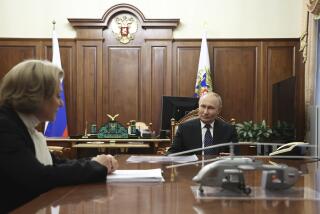Ukraine president takes over troops
- Share via
MOSCOW — In the midst of a bitter political standoff, Ukrainian President Viktor Yushchenko issued a decree Friday transferring control of Interior Ministry troops into his own hands and away from a minister loyal to his longtime rival, Prime Minister Viktor Yanukovich.
The prime minister said the president’s action was unconstitutional. Parliament, which is controlled by the prime minister’s allies, passed a resolution declaring the decree legally void, and Interior Minister Vasyl Tsushko said he would try to keep control of the troops.
It appeared, however, that Yushchenko had succeeded in firming his authority over security forces, because the direct commander of the Interior Ministry troops, Gen. Oleksandr Kikhtenko, is considered his ally. As commander in chief, the pro-Western Yushchenko already had control over the army and the national security apparatus.
The dispute involves roughly the same political camps that faced off in the 2004 Orange Revolution, which saw Yushchenko defeat Yanukovich for the presidency after street protests led to the overturning of the results of rigged balloting.
The new decree covers Interior Ministry troops with military training, who can be used for anti-riot operations, and does not include police. The ministry has about 32,000 troops and 220,000 police officers.
Yushchenko’s decree “can be both interpreted as legal and not quite so, depending on who is doing the interpretation,” Oleksandr Dergachyov of the Institute for Political and Ethnic Studies, a Kiev think tank, said in a telephone interview.
The latest confrontation erupted last month when the president accused the prime minister of using unconstitutional means to try to cement his hold on power. Yushchenko issued in April a decree dissolving parliament and calling elections, but parliament and Yanukovich refused to accept that action, describing it as unconstitutional.
Early this month, Yushchenko and Yanukovich said they had agreed to resolve the struggle by holding parliamentary elections, but they did not set a date. Since then, the president has pushed for elections to be held this summer, whereas Yanukovich says they should come in the fall. Most polls have shown the two camps about evenly divided, leaving the likely election results too close to predict.
Although the contest for control of Interior Ministry troops added to concerns that the confrontation could yet bring bloodshed, the two camps were generally seen to be maneuvering for advantage in a battle to be decided at the ballot box.
“I still think that what is going on is not preparation for a real violent clash but rather building up better positions for the elections,” Dergachyov said.
Yushchenko’s main base of support is among voters in the western part of the country or in Kiev, the capital, who want faster integration with Western Europe. Yanukovich, who says he wants good ties with both the European Union and Russia, draws much of his strength from eastern Ukraine, home to many ethnic Russians as well as Ukrainians who speak Russian as their first language.
The key players in the contest met Friday evening in another attempt to hammer out a deal. Both sides have emphasized that force must not be used to break the deadlock.
The president’s move came a day after forces loyal to each side tussled physically for control of the building that houses the prosecutor-general’s office.
Yushchenko dismissed Prosecutor-General Svyatoslav Piskun on Thursday, but Piskun, a Yanukovich loyalist, refused to leave his post. The interior minister and forces under his control helped the prosecutor-general regain physical possession of his office later Thursday.
Times staff writer Sergei L. Loiko contributed to this report.
More to Read
Sign up for Essential California
The most important California stories and recommendations in your inbox every morning.
You may occasionally receive promotional content from the Los Angeles Times.










